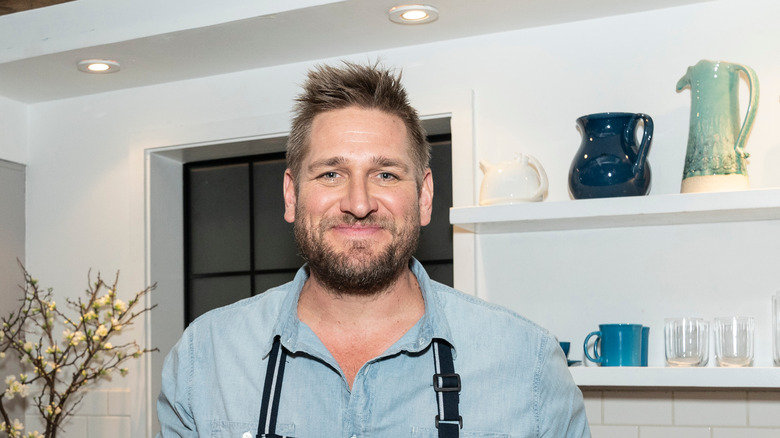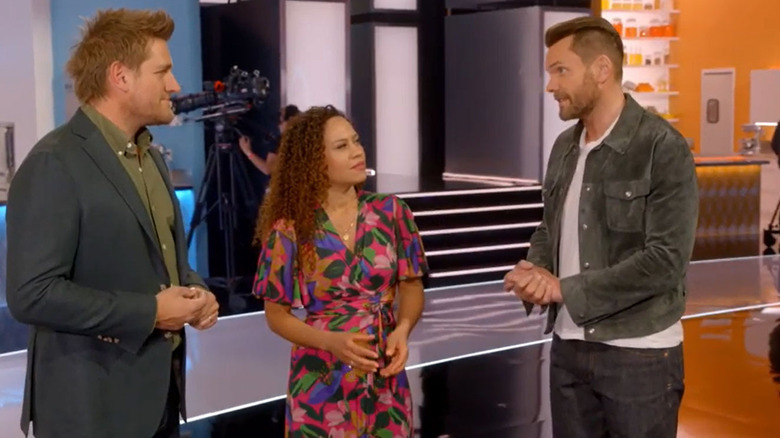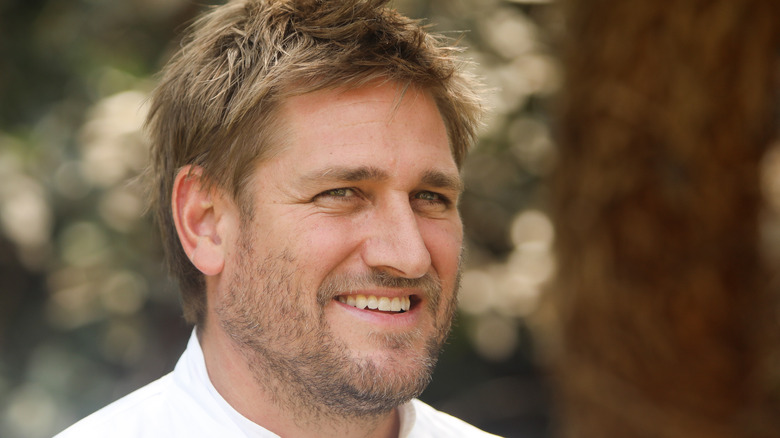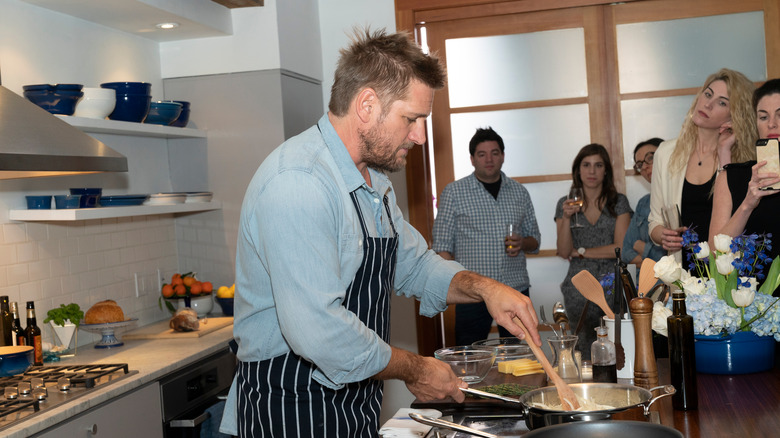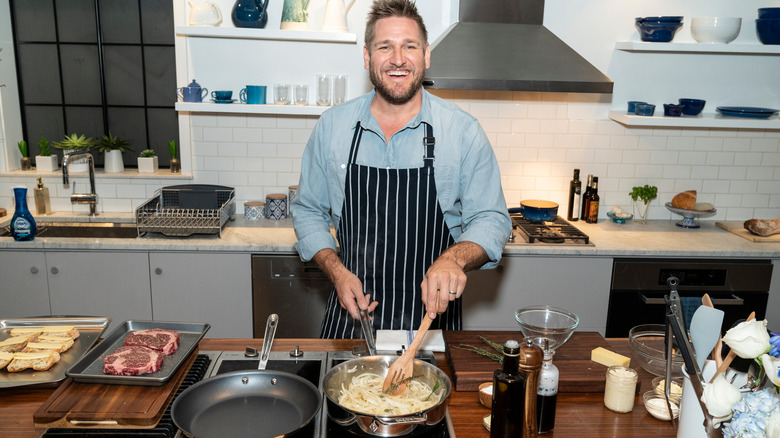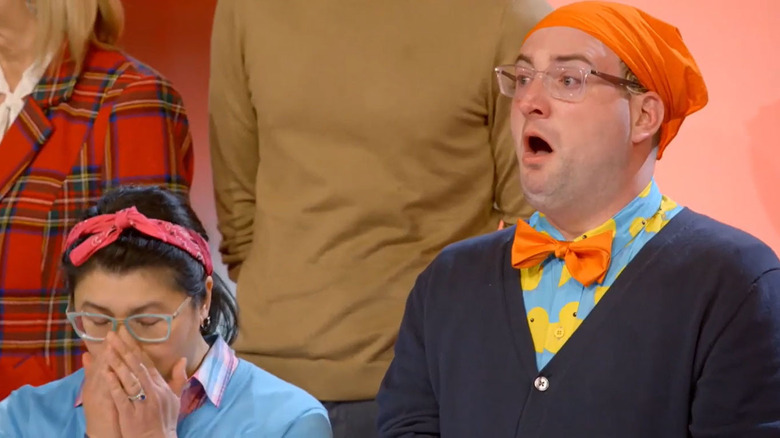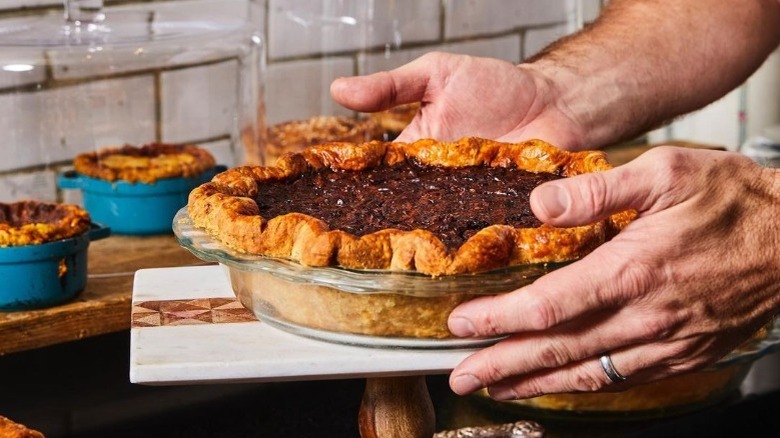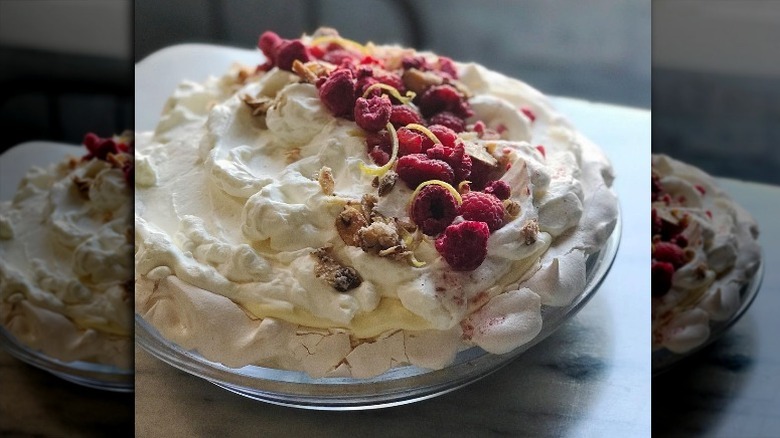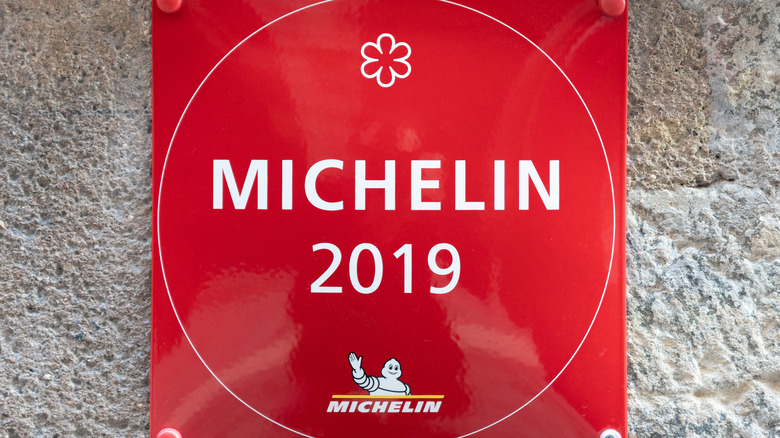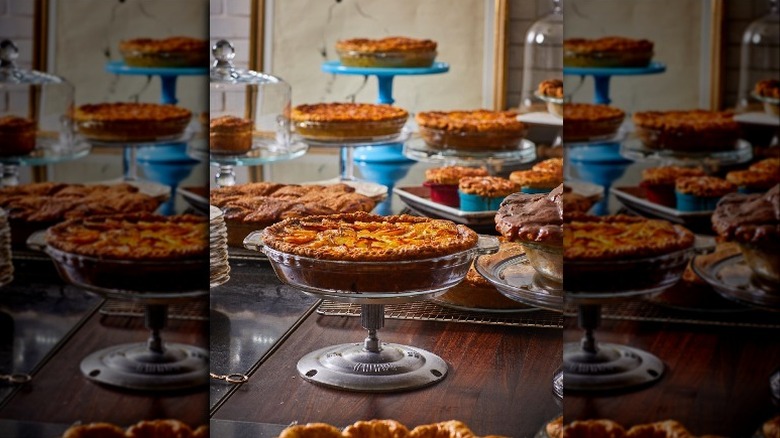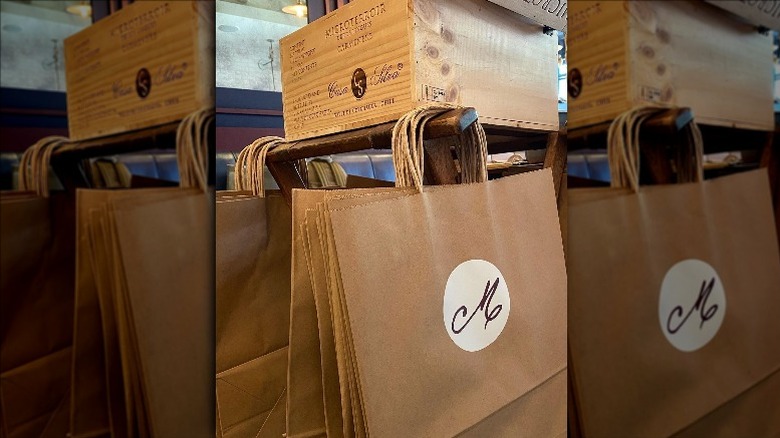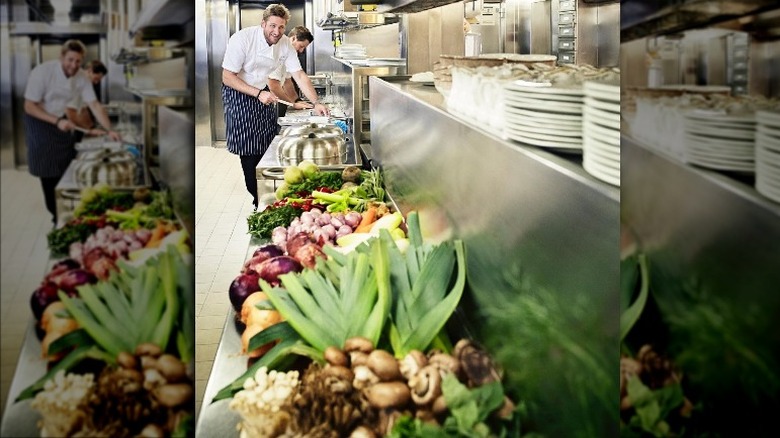Curtis Stone Dishes On Crime Scene Kitchen - Exclusive Interview
Fans of Curtis Stone likely know him from his previous television shows such as "Take Home Chef" or "Top Chef Masters," but his latest television show, "Crime Scene Kitchen," is just around the corner. Set to premiere on May 26, the latest baking show to hit Fox is garnering a lot of attention from his fans and bakers alike. While the exciting new baking competition requires the contestants to pull out their inner detective skills, Stone is judging the sweet treats the contestants whip up. Many people are excited to see the chef's approach to the sweeter side of the meal.
Apart from his role in the exciting new television show, the Australian chef sat down with Mashed to discuss his plans moving forward with his Michelin-starred restaurant, Maude, among other things. From his favorite desserts to creating the dishes that appear on his restaurant menus, Curtis Stone dished on all things sweet — and a few savory — in our exclusive interview.
Curtis Stone breaks down the unique twist of Crime Scene Kitchen
Could you tell us a little bit about "Crime Scene Kitchen"?
So it's a really fun show. We've all seen lots of culinary competitions and the way this one is different is it's a bit of a culinary guessing game and then a cooking contest. So what we ask our contestants to do, and they're in pairs of two, is to run into the Crime Scene Kitchen, we've affectionately named it. And they have to sort of decode the clues that are left behind from a cake or dessert being made. And so I guess as a chef, as a baker, you run into a kitchen and you sort of look around and you're like, "Oh, there's a pastry cream that was made. Or I noticed that the cake pans were in the dish rack." Or whatever.
So you figure out what you think was baked in that kitchen, and then you run back to your kitchen, and then it's a culinary competition. But the interesting part is, they're all kind of baking something different. Well, sometimes they are. Sometimes they all guess right. Sometimes they all guess wrong. It's one of those things. So, and then Yolanda (Yolanda Gampp is Stone's co-judge) and I taste all of their creations and tell them what they did right and wrong, and then obviously the ones that guessed right are safe and the ones that aren't, one of them goes home.
Curtis Stone on taking a desserts-forward direction
Tell us about how you decided to take this project on, since it is kind of a desserts show and it seems like that's a little bit of a change for you.
I started my career as a butcher actually. I worked for a year and a half in a butcher shop and then started cooking, and I was lucky enough to be working in a five-star hotel that had all sorts of different departments, a butcher shop being one of them, and also a pretty interesting pastry section, bakers baking bread and whatever. So I worked pretty extensively in that kitchen and I guess it's good as a chef to be well-rounded and have a good background in the whole kitchen.
I've worked in pastry stations a lot. I have a crazy sweet tooth, so I'm really in tune with what's good and what's not. Yolanda has a really specific set of skills. She's an incredible cake decorator. And as a cake decorator, you deal with modern chocolate and fondants and marzipan and making beautiful little sugar flowers, and it's a very specific skillset. And as a baker, I have a pie shop where we bake the most fabulous pies and pie doughs and crusts and breads, and all of that sort of stuff's really in my wheelhouse. So I think our skill sets really compliment each other well. And yeah, I mean, there's nothing wrong with eating five or six pieces of cake for a living. [It] Was really good fun. So of course I said yes.
Curtis Stone shares what sort of Crime Scene Kitchen clues to look for
Could you maybe tell us about some of the clues that contestants overlook?
Well, there's lots. First of all, just because something's in the kitchen doesn't mean it was used. And you might think that this is a little tricky, but sometimes they'll open the fridge and there'll be a punnet of raspberries and they're not opened. So just because they're there doesn't mean they were used. So you've got to kind of use your brains a little, as you're sort of looking through it. And of course, you're doing it in a really short amount of time and quite quickly. So it's easy to see a bottle of Marsala, and go, "Oh, there's Marsala. It must be a Sabayon that was made." But maybe the Marsala wasn't opened. Some of the clues have to be decoded, if you like. And then of course you might find evidence of a pastry cream, but that could take you in 10 different directions.
It could be the filling of a profiterole. It could be the center of a cake. It could be a custard that's served with poached fruits, it could be lots of things. So trying to figure out, if it was a coffee-centered pastry cream, maybe that takes you in a slightly different ... If it was a coconut pastry cream, that might take you somewhere else. So it's really interesting watching how different minds work, because we have both classically trained pastry chefs, we have bakers, we have self-taught bakers, we have home cooks, we have mother and son teams that are like, "Well, we're just going to try and figure it out." And it's pretty cool to see who goes a long way.
Some of the show's contestants surprised Curtis Stone
So whether it was the desserts that the contestants made or how they viewed the clues, what were you most surprised by on the show?
I was so shocked at how much work these teams got through. I mean, I've done this kind of thing for a long time. And when someone gives you a pretty vague ... I mean, it's hard enough when someone says, all right, your challenge is make a wonderful chicken dish or a wonderful chocolate dessert. And you're like, "Okay, cool. I know what I'm supposed to do." But when you're sort of the whole time in your head of like, "But it could be this and it could be that and oh, did I miss something? And, oh, now that clue makes more sense."
But they just got down to business. In some challenges they're doing, we saw everything from five-tier cakes to croquembouches, to all sorts of incredible big pieces. Not saying that they were or weren't the desserts that [they] were supposed to make, but there's some really ambitious stuff that if I showed you some of these pieces that came out at the end of the couple of hours that they get and said, "Do you think this could have been achieved into two hours?" You'd be like, "No way. There's no way that got done in two hours." It's very ambitious and they get through a lot of work, which is pretty cool to watch.
Curtis Stone shares the key to a successful cooking team
What do you think sets the successful contestants apart from the others?
This is a bit controversial, but I always think a really good kitchen has a leader. And if you both kind of just go through your paces and think, "Well, I'll go ahead and do this and let me know what you're going to do." It almost needs someone to be like, "All right, here's the plan. You're going to do this. I'm going to do that. That's going to happen by this time. And then you're going to be in charge of the decoration. I'm going to be in charge of the finishing of the cake or whatever." I always feel like that's a better strategy than both kind of just having a conversation about it the entire way through the challenge. And in some teams you see there's a natural leader and in some there's not.
I guess the other thing is some people are really chatty at the start. I mean, I say this all the time in my own life where I walk into the restaurant and it's very natural to get to work and sort of just slowly crank up. Like get a coffee, get your cutting board out, sharpen your knife a little bit. And my thing that I'm always saying is rush now. Feel the urgency the second you get to work and at four o'clock be cool. Take a break, get a coffee, go sit down for half an hour. Just know that you got through all of the work. Don't rush at the last minute, but ultimately that's just the natural way of doing it, I guess.
The Crime Scene Kitchen mistake that can derail a contestant
What was the most common mistake that you saw people make on "Crime Scene Kitchen"?
Second-guessing themselves. You know, that's one of the really interesting parts about this guessing game is once you sort of make a decision and you start baking, it's pretty hard to change track. It's pretty hard to pivot halfway through a bake and suddenly try and do something different. But ultimately people do. I think they see the clues and they don't make sense at the time and then they start baking and then they're like, "Oh s**t, I think it was, we're supposed to do something else." So they sort of do a U-turn and then they don't have enough time. And then they end up with nothing that's wonderful, where even if they chose the wrong thing, if it was still fabulous, there's a pretty good chance they stay in the competition.
Joel McHale was always ordering food for the Crime Scene Kitchen set
Can you share anything from behind the scenes?
Well, it was my first time working with Joel McHale and he's genuinely one of the funniest humans I've ever met. I mean, he's such a smart ass and he's constantly having jabs at everyone, himself included. And it was a pleasure to work with him. He's a real professional. He's really good at what he does, but genuinely funny. And when you're around someone like that, it passes the time really easily.
And Yolanda's super talented too. The three of us couldn't have gotten along better, which doesn't always happen. It's nice when it does. Joel's a real foodie, so he's constantly sending out for ... "Have you had these croissants? They're the best croissants in L.A. Have you had these tacos? They're the best tacos." He's got the best of everything in his own mind and he brings it in and shares it with everyone and he'd bring in his wine and it was pretty cool. It was a pretty cool behind-the-scenes experience. And it was also a huge show, to work on such a big stage and with, it was a lot of moving parts and a new format is always exciting. So yeah, it was lots of fun. It was a really good energy on set.
Curtis Stone tries on the Crime Scene Kitchen sleuth hat
If the tables were turned and you were in the "Crime Scene Kitchen," how would you approach the clues?
Oh. Goodness. I always sort of thought maybe the right way to do it is silently. Which I'm sure our producers would be like, "No, no, we don't want you to be silent. We want you to tell us what you're thinking." But almost start at opposite ends of the kitchen and go around it like that and just have your independent thoughts. So, because I might think something and if I don't verbalize it, and then you say something else, I'm like, "Oh my God, you're so right." But if I'd have said at first, you might've been influenced by that and not had that independent thought.
I think with this, you've got to divide and conquer while you're playing the guessing game. They get two or three minutes in the kitchen to try and figure out, so it's not long. But you got to use your senses. You got to smell, taste, feel it. You've really got to just get in there and be like, "Oh, that's what it is." As opposed to, "Ah." Because the truth is, melted white chocolate doesn't look this similar to five other things that it could have been left in the kitchen. So you've got to get in there to really know.
Curtis Stone's love for making desserts started with caramel chocolate bars
So if you're not trying to put the clues together, then what's your favorite dessert to make?
My God. It's such a hard question to ask someone that's obsessed with desserts. I always have been, since I was a kid. Actually my first ever recipe, I've still got it written down. It was a caramel slice, which was a bit like a caramel chocolate bar and I can still taste it. And my idea of my first recipe, I think I was probably seven or eight, is I stole the ingredient list from the "Women's Weekly Cookbook," which came out of the stack of cookbooks that my mum had. And then I got maybe the recipe for the base out of a different cookbook and I combined those two things and then that was my recipe.
But I love chocolate and I love citrus, not together. But I usually live in that place. When I look at a dessert menu, I'm either in the citrus camp or the chocolate camp. I like berries and stuff too.
And, of course, making pies for a living for the last couple of months has been really fun, because you sort of start with a delicious crust, and as the seasons change we're coming, we've just gone through spring and there's strawberries and rhubarb, and we're doing a wonderful strawberry rhubarb pie, which is divine. But now comes cherries and grapes and peaches and next, and you start getting excited about that. So tarts, puddings pies, steamed puddings. Steamed pudding's probably my favorite thing in the world.
How Curtis Stone chooses the desserts for his menus
How do you go about picking which desserts make it onto your restaurants' menus?
I think the reason I've always had such strong relationships with my pastry chef is I go to their station a lot and I eat their mise en place a lot. And they're like, "Oh my God. You really do love desserts." And I think you've just got to put yourself in the diner's seat for a minute and be like, I've just had ... For every restaurant it's different, right? For Maude, we serve nine or 10 courses. So, you've just had, someone who's just had seven or eight courses, and then it gets time for the sweet courses.
So it can't be too heavy in our format. I get it. If you go somewhere else and maybe have a bowl of pasta then sure, chocolate lava cake's fine. But I kind of feel like your dessert menu has to work with the rest of your menu. And we have one that's very meat heavy, and people are usually sharing a big old steak. And again, you don't want anything that's going to make them feel like they have to unbutton their pants in the restaurant. My desserts are usually relatively well balanced, not too definitely rich. But very, yes, delicious. They got to be the perfect balance.
Curtis Stone looks back on receiving his first Michelin star
When you received your first Michelin star for Maude, what was that like? How did you react?
It was euphoric. I mean, look, I was in Australia and I couldn't get back because they didn't tell us until quite late when the announcements would be, and it was too late for me to get a flight to come back for it. So I was kind of devastated that I wasn't going to be here, but in my head I was like, "God, if I don't win one, I'll be so bummed. I don't want to be around anyone." So I had to watch it on the internet. And it's, I suppose it's sort of a lifetime's work. It doesn't mean anything apart from the fact that it substantiates how you hope people think about your food, you know what I mean?
And the Michelin guide is so well put together and it's so accurate. It's almost impossible for you to go to a Michelin star restaurant and have a bad meal. At least that's been my experience, and so when you get one, you're kind of like, "Oh s**t, yeah. We're kind of good at what we do." It's a really good feeling. And even more, the personal feeling is your team and how they feel. Because you know how much work they put into it and how many sacrifices they make to do that kind of food. So yeah, when you can acknowledge their hard work, it's really awesome.
The pandemic forced Maude to pivot in a big way
The shift at Maude and turning it into The Pie Room by Gwen. That was such a change that you had to undergo during the pandemic. How has that been?
It's been incredible. We've gone through a variety of changes. It's been interesting, crushing, devastating, exciting, exhilarating, all these different things. You're like, "What do we do? Do we just crawl under the blanket and pretend it's not happening? Do we try and get inventive and come up with something new?" And at the end of the day, your biggest asset is your team. We said, "We're going to fight. We're going to fight our way through it as best we can. We're going to try and keep as many of our team employed and taken care of as possible."
Restaurants are a really interesting mix of humans. We have some Chrysalis clients. Chrysalis are an organization that help people that have either been incarcerated or homeless or just super down on their luck. They try and get them back into the workforce. In many cases, they've gotten off drugs and they're wanting a new chance at life. So we employ those guys in our dish pits and as prep cooks. In my team, the people that I heard from that really needed their jobs intact were those kinds of guys, the single moms that we employ, we employ non-English speakers. It's a scrappy business, the restaurant business.
It makes you fight. It makes you want to stand up for them. So that's what we did. We did a couple of different pop-ups, and we're still doing one at Maude. It's a tiny restaurant, so it can't be open. And there's something really depressing about building something for years, and then you look at it closed. That's sort of where that idea came from. In Australia, we love pies, both sweet and savory, and we eat sausage rolls and Cornish pasties and all those things. I just decided to do that. It's been a big hit. We sell out most days by lunchtime.
Curtis Stone hopes to reopen Maude soon
Now that so much of the country is moving forward and there are vaccines and people are starting to kind of get back out again, are there any plans to reopen Maude?
There sure are. We're putting it all together now. It's difficult because it's hard to plan until you know you can do it. With a 24-seat dining room, it's seven tables. So when they're like, "Oh, you can open to 50%." I'm like, "Oh yeah. Do you want to go to a restaurant with three tables in it? I don't think so." You can't do it that way. You've got to wait until you can do it at a hundred percent. And it sounds like that's going to be the case sort of later in June. So yeah. As soon as we're allowed to we'll start putting that plan back together and we'll reopen all right. We're excited.
That's great. Very exciting, and something to look forward to after a long slog through the pandemic.
I know, I know. You have all these Michelin star chefs, these incredible guys that are used to cooking incredible cuisine, and then suddenly for the last year, they've been making mashed potatoes and Shepherd's pies. And there's nothing wrong with that. It's been fun, but at some point you're like, "I want to get back to what I do."
Curtis Stone's wife turned him on to In-N-Out Burger
If you could pick one kitchen tool, what would it be?
This is super self-indulgent, but I make a nonstick cookware. It's called DuraPan. And it's so good that you can get a screaming hot, like you can cast iron, but you can get beautiful sears on everything. So, that's my DuraPan.
What do you typically eat in a day?
Everything. I eat a lot. I cook breakfast in the morning for my boys and that's pretty healthy, fruit and bacon and eggs or cereal, avocado toast, English muffins. Then I kind of, I'm a grazer, of course in the kitchen, you work your ass off. So you're on your feet all day and you're constantly cooking stuff. So you're constantly tasting it. So we don't sit down and eat multiple meals, but we do all sit down as a team around five o'clock, just before four o'clock, just before service and we all eat together. So that's sort of a bigger meal and that's always cooked by someone different and something different. I usually have a bit of a midnight snack when I get home as well.
What's your favorite fast food item?
Tacos. I don't really go to chains to be honest. My wife's (Lindsay Price) introduced me to In-N-Out. So if we're on a trip, I might hit a Double-Double. Is that what it's called? Yeah. Double-Double, animal style, but I don't eat from chains very often.
Good food starts with good ingredients, says Curtis Stone
What's the worst kitchen nightmare you've ever had?
I nearly burned down a restaurant in London. It was called Bluebird. It was my first week working at this restaurant, and I tried to get this wood fire oven that no one had used for a long time back up and running. And it started a fire in the ceiling above the oven and this AAA rated heritage building was literally on fire. And thank God we put it out, but that was a pretty big disaster.
Do you have any cooking tips or recipes you'd like to share with our readers?
I think cooking doesn't have to be difficult. The idea of farm to table, it's really good shopping. If you go to a farmer's market and you buy some delicious seasonal ingredients, you kind of just put it together. You don't even have to do a lot of cooking. Say grilling a steak with some beautiful vegetables that you steam. I mean, it can be that simple making a quick, simple sauce, like a chimichurri. So I think sort of, not trying to do too much and not being intimidated by it is probably a good first step.
Be sure to tune into "Crime Scene Kitchen" May 26 on Fox.

